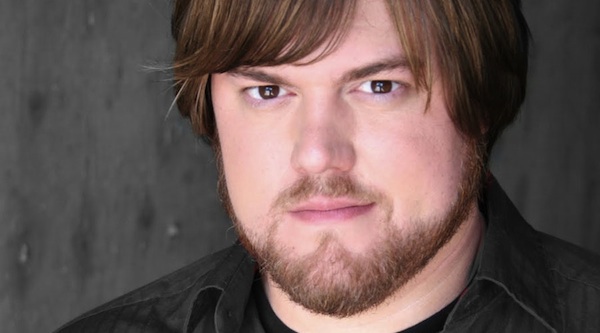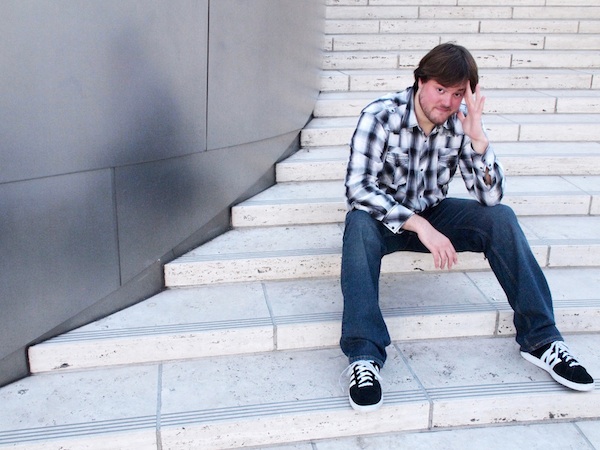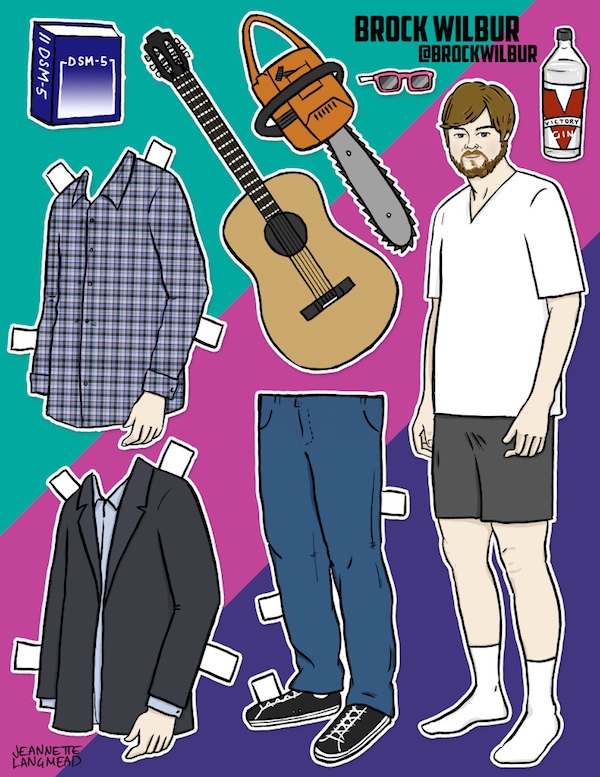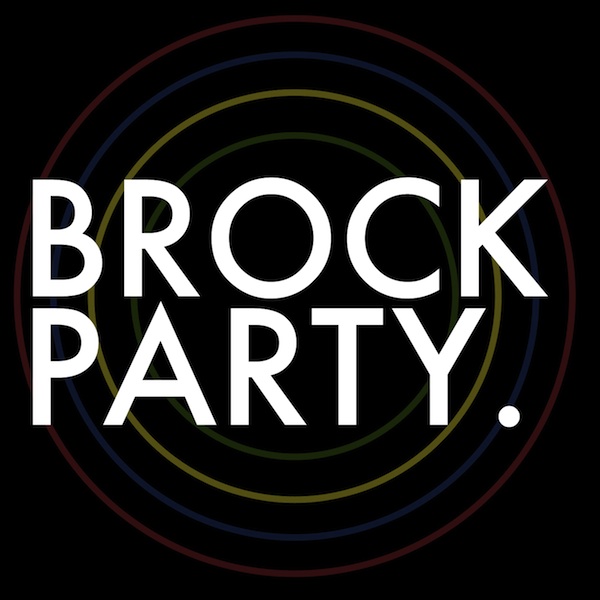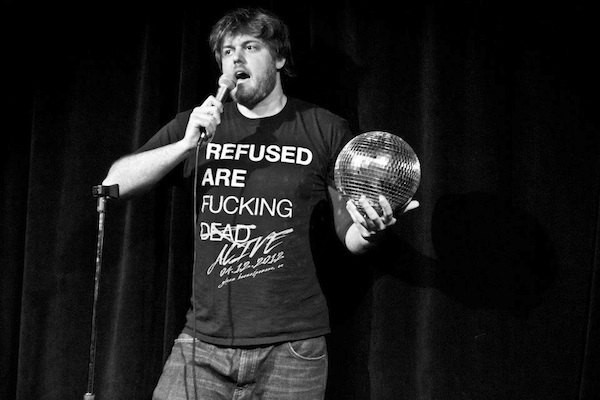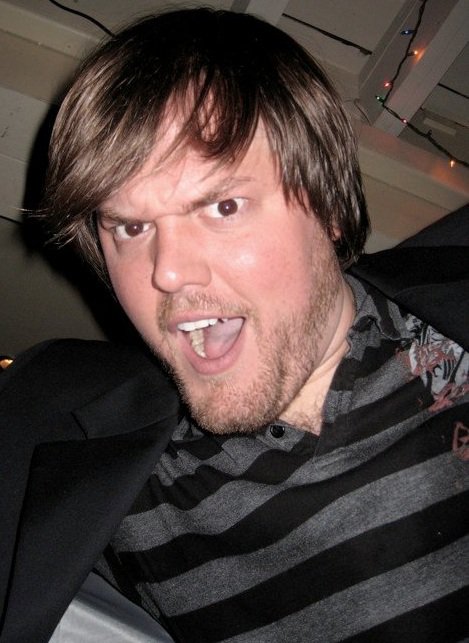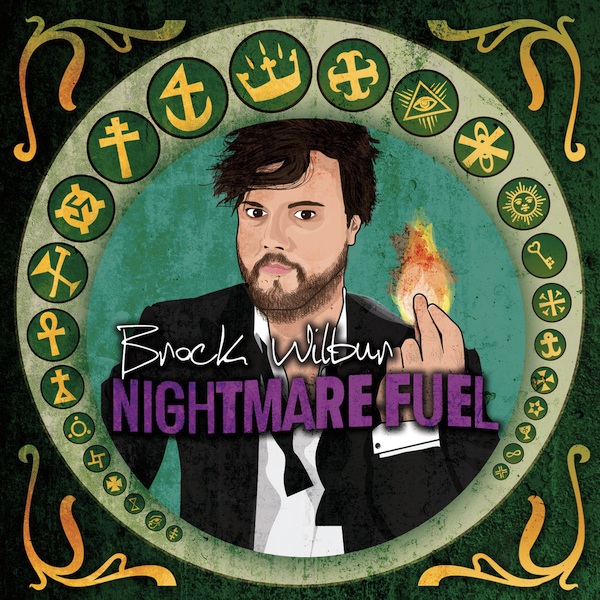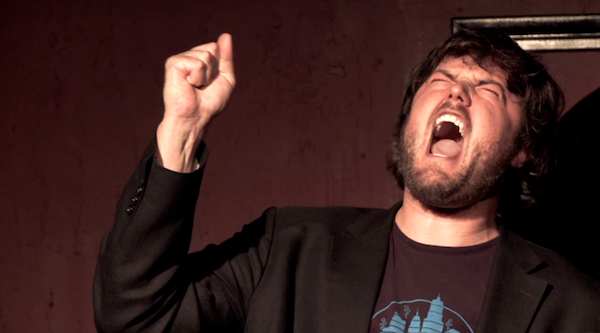The 57th Grammy Awards bestowed the honor of Album of the Year and Best Rock Album to the musical artist Beck. Legions of “Tweeters” knew who Kanye was, but they had no clue who Beck was. Guess who does know who Beck is? BROCK WILBUR! The ‘Morning Phase’ creator was a solid source of inspiration early on in life for this musician turned comedian. Beck’s works prompted Brock to write. The writing lead to his first album. The album profits paved the path to working in indie bands which ultimately prepared Brock for a career in comedy. Today Brock applies the tools that make him a talented musician to being a solid comedic performer. His prolific writing skills have produced books, films, and three comedy albums, 28 Years Later, Crime Travel, and Nightmare Fuel. His stage confidence allows him to be comfortable enough to perform on a web series, at a comedy show or on a podcast like Brock Party. The perseverance built from a music background allows Brock to stand strong when he has to face a difficult audience or grueling time on the road. Of course, Beck didn’t make Brock funny, but he helped plant the seed that’s flowered into a flourishing occupation. Now learn more about Brock and Google Beck plus Nicotine & Gravy later. I have a feeling Brock will be earning plenty of accolades in the future (just like his boyhood catalyst).
COMEDY CAKE: What’s it like sharing a first name with both real and fictitious American heroes like UFC champion, Brock Lesner, and kickass Venture Bros. character, Brock Samson?
BROCK WILBUR: Out of all fictitious Brocks, I actually get asked about the Pokemon trainer more than anyone else. It was kinda of nice when there were only fictitious Brocks, and then I worked on Barack Obama’s 2004 Senate run in Illinois and day two was when people realized shouting “Brock” around the office could illicit two possible responses. Venture Bros. was great because I distinctly remember leaving my TV on late one night in high school while doing homework and the third Venture episode was playing, where they specify that Brock only does sex or murder at everyone, and I kept thinking I was imagining what I heard. About three years back I met James Urbaniak for the first time (voice of Dr. Rusty Venture) and I spent the whole night trying to disguise my fangasmic joy when he said “Brock.”
CAKE: What beckoned you to Los Angeles besides the sunshine, palm trees, and delicious tacos?
BROCK: I was leaving film school and a short film we’d made had just won a student Emmy for being the most awesome murder robots vs. treasure hunters film they’d ever seen. So I moved out to pursue the completion of the feature length adaptation (never made) and wound up working on a lot of other, much much worse action films (all were made).
CAKE: Do you ever find yourself pining for the comforts of your hometown of Salina, Kansas? Is there a comedy scene we should be aware of in Kansas?
BROCK: I tend to go back each December, as LA shuts down for the month. Usually my first thought is “Hooray! I’m going to get so much beautiful snow!” And on morning two, as I’ve entered the thirtieth minute of clearing our unreasonably long driveway with a shovel, I remark “Hooray! I’ll go back to LA and never deal with the practicalities of snow again!” As for a comedy scene, there are a couple dudes in my hometown who just started running a monthly gig, and we recently rebuilt a historic theater that has become a weirdly accessible stop-over gig for major acts who have a night between Kansas City and Denver. Jim Breuer, Steven Wright, and (shockingly) Lewis Black have all been thought in the last year, which has given me a chance to both travel home and open for some comedy greats before I’d probably earned the right. For reasons I’ll never understand, David Sedaris booked a night in my small Kansas town, and even with two weeks of ticket giveaways they couldn’t find enough people to fill more than a few rows. My Dad went, and texted as he left during intermission, with this weird sense of pride that he’d endured this perceived onslaught of liberal mind-control. That night, I remember being unreasonably mad at him for walking out, but lately I’ve regained the perspective that in his 60th year, he’d attend that show just to prove to me how open minded he is. The take away was actually really helpful, because I couldn’t explain what a “storytelling show” was previous to this, and now my father just pictures me doing what Sedaris did, only much better and without trying to steal anyone’s hard earned capital to fund the openly communism NPR on the take from the gay agenda.
CAKE: Please tell our fine readers about your involvement in Chicago indie bands. In your experience is it more difficult to put yourself out on stage as a comedian or musical artist?
BROCK: When I was in middle school, and the only musician I listened to was Beck, I grabbed hold of a small analogue eight-track recorder and started writing and producing entire albums by myself. At the end of seventh grade, I released my first album, and sold about three hundred copies. (Full disclosure now: at least one of those songs was an un-produced Radiohead b-side from “The Bends” era that I’d found in the earliest days of the internet.) Each year, I’d reinvest whatever profits I’d made in buying better studio equipment, and by the time I hit high school I was running a full blown studio and a record label. Then, I’d take the albums I’d written, find a band to play the other parts, and we’d go on tour in the summers; which remains the best possible summer job. When I moved to Chicago, there was a noticeable shift in both talent and expectation from the shows I’d headlined in Wichita to the Friday night sets at Double Door. The combination of living in a major city and interacting with kids in a collegiate setting led to a lot of changes for my perspective and my music. For example, the first Jewish person I’d ever met was a kid down the hall from Philly, who also introduced me to the concept of mash-ups the first night we hung out. Electronic music and DJ work suddenly played a huge part for me, especially when finding drummers with full kits and rehearsal space became problematic (I still fully believe this drum problem is the reason A Capella is so big in college.) In my freshman year, me and my friend Derek wound up taking on night work at the hip new club in Chicago, which led to me working alongside a rising star named DJ AM. I took everything I learned in this time and poured it into an electro-punk group that has dance music backing tracks and live guitars, synthesizers, and electric violins, accompanied by synced music video projections. We took this whole spectacle on the road for a nationwide tour the same summer that the price of gas decided to spontaneously break the three dollar mark, and suddenly an easy-going tour booked amongst MySpace friends became a nightly battle to cover our costs. The more former musicians I meet in comedy, the more we reminisce on the great time we had blasting loud nonsense out of six-foot tall speakers, but also we’re all thankful to not be dragging a metric ton of equipment on and off stage each night. There’s something incredibly freeing about being able to perform comedy in any room with a mic and a stand, whereas my final indie rock tour required nothing less than two laptops, four amps, and sixteen PA inputs.
CAKE: If you had to choose between movie writing and standup comedy writing, which would you pick and why?
BROCK: I’d been doing movie writing in LA for a number of years, and got to work on some excellent things that I’m proud of and also a lot of drivel that has ten extra jokes or a slightly tighter third act, thanks to me. I started putting the money I made from awful corporate stuff into indie films I super believed in, but the process of getting a project from page to screen for an audience can take anywhere from one to five (unfortunate) years. Dear god, may you never be forced to watch something that represented your level of talent a half-decade earlier as if it was just completed. It is not pleasant. One of these specifically unreasonable turn-around times is what finally drove me to standup, where you can construct a concept, find a mic, and test its reaction within the same day, instead of hoping it will still speak to audiences years from now. One of the projects that’s most personal to me is an indie film I wrote and we shot several months before I first tried standup comedy, and its official release was just on the heels of my second hour long album. So while standup has captivated me for the last few years, 2015 is already arranged for me to make several new forays into the feature film world; mostly within projects that are young and scrappy enough that you should see them completed by year’s end.
CAKE: Please tell us about your contribution to the literary work “Exquisite Corpse, A Literary Benefit for KidSave Intl”. What was it like writing a chapter based on what you gleamed from the final paragraph of another comedian’s written word?
BROCK: Exquisite Corpse was actually a project me and Sofiya Alexandra got off the ground. We wanted to do something which allowed comedians to dabble in the written word while benefiting a group we believed in. The idea of an exquisite corpse project isn’t anything new, but I think the talent we put behind it led to something pretty spectacular, and we were able to write a pretty impressive check to KidSave International when the whole thing was wrapped.
CAKE: You dabble in many aspects of filmmaking. Which genre would you use for the feature film that would truly represent Brock Wilbur? Would you be the star? Who is your favorite director? What are you favorite comedy films?
BROCK: I’m that kid who rented “Clue” from Blockbuster so many weekends in a row, they eventually just gave me a copy. I’d like to think that represents my comedic sensibilities, but what really grabs me are the films that intend to be dark and cruel, who just happen to be stylized or clever enough to make certain lines pop into laughter, if you’re the right kind of person to receive them. Whiplash is something I caught in the theaters this month, and it’s the most I’ve ever heard an audience shout “Oh God Oh Shit Wait What Oh Man Jesus Christ” to something in almost every scene. That kind out outward, unrestrained reaction is probably the thing that excites me most about both cinema and comedy. The genre takes a back seat to the reaction you pull.
CAKE: You spent some time touring the country in 2014 with fellow comedian Brandie Posey. Can you tell us about your adventures in arcades, ice cream parlors, backyards, etc? What’s your favorite part of being on the road?
BROCK: Brandie Posey is a goddamned national treasure, and if you aren’t subscribed to the Lady To Lady Podcast we’ll all pause while you do so now. Brandie is someone I met super early in my comedy career, and was instantly blown away by her voice, style, and possession of an audience, so when the opportunity arose to travel across the entire country with her, it was a no-brainer; not only as a performer, but as someone who was super stoked to watch this comedian do an hour of original material every night. Probably our favorite/worst/most haunting experience was attempting to find a 4am hotel in the middle of Ohio, where a combination of regional fracking, a pottery convention, and sleep deprivation led us to believe we’d fallen in amongst a vampire coven and that the rising sun would signal our doom. Luckily, we found the only vacant room in a 165-mile radius of our destination, and a pleasant but hopelessly confused elderly check-in clerk alternated between being incapable of processing our credit card, and trying to sell us on the free coffee we might want to imbibe at 6:30am, despite the bloodshot mania radiating from our horrified faces. In over a month of touring, we only needed to book one hotel room, and the story of securing it led to months of trigger-dreams and just a hint of PTSD. So maybe plan your tours with some reasonable checkpoints instead of planning on powering through the night with no backup plan.
CAKE: So I must address your album “Nightmare Fuel”. I didn’t realize a comedy album could make one so weepy, awestruck and jubilant in one sitting. How much material did you prepare and how much was added on the fly?
BROCK: About 70% of the album is material I’d consider straight comedy, and the rest borders on storytelling. I feel very comfortable when I’ve built up a solid 30 minutes of new jokes I know are solid enough to take to a comedy club, but depending on audience mood sometimes delving into personal experiences that lack a traditional comedy structure can be much more rewarding.
CAKE: During the set you refer to a neighbor who you believe “solves occult murders around the globe” on his phone. The incident seems to have been the main inspiration for the title of the album. Does this fellow still live near you and does he know he was referred to in the track?
BROCK: He’s a goddamned lunatic who loves to stand on the street beneath my bedroom window (which has a fun reverberation/echo that makes it seem like he’s in the room with me, breathing down my neck) and he loves to call business that he is a customer of, because no matter what he says, they can’t hang up on him. I’ve cringed and choked on sad-laughs listening to him explain what REALLY happened to JFK at 7am on a Tuesday while on speakerphone with a beleaguered T-Mobile service rep who cannot escape. Two years ago, I thought I wanted this neighbor dead, but now his desperate yet vengeful platforms motivate me to get out of bed and take on someone unprepared for my wrath, each and every day.
CAKE: What other surreal memories keep you up at night?
BROCK: I went through a period during the winter of somehow recalling each person I’d ever wronged, in even the smallest way, just before drifting off to sleep. There was a really fun week for me where I made a list of those names, a list of possible ways to rebuild my relationships with them, and then on a Thursday night remembered that some people just aren’t worth your time, and never looked back.
CAKE: Do you think juice cleanses will ever go away?
BROCK: All the scientific information in the world says that there is no such thing as a “cleanse” and nothing you put into your body can possibly remove toxins faster than their normal transitional periods. However, there is something kind of great, and almost manly in a millennial sense, about forgoing all earthly pleasures for a fixed period of time to endure only kale and greek yoghourt and vitamin powder or whatever it is. Maybe there isn’t a fruit that makes you blood “cleaner” but I’m just enough of a monster to require these stupid exercises in self-preservation, because I cannot write “NO NACHOS THIS WEEK” on a tablet and stick to it otherwise.
CAKE: When you quit smoking, did you go cold turkey or did you have the occasional ‘bum a cigarette’ breakdown? Why AREN’T there cigarette variety packs?
BROCK: It’s hard for people outside comedy to understand how you can find yourself as a dedicated smoked whilst never actually buying a pack for years, but for anyone with a regular open mic gig it’s pretty easy to understand that this just becomes an economy of conversation. It winds up being your third night in a row with a cigarette in your hand, and you don’t remember every asking for one, and a few weeks later you notice a particularly elaborate bit is no longer something you can perform without an extra breath in the middle. Smoking for me was that weird surprise of “No, I’m certainly not a… wait where did this cough come from? Oh, I just noticed I’ve been passively doing this for years.” So my quitting became a pretty easy cold turkey cut off, since it wasn’t something I ever intentionally engaged in. The hard part becomes the four or five people I’ve trained myself over time to have a Pavlovian reaction towards, in terms of expecting that their arrival heralds an immediate cigarette break. One of my friends identified that we’ve both been this person to each other, leading to a lot of questions about where the cigarettes materialized from over the last few years.
CAKE: On the album you bring up a number of deaths of friends & loved ones. You are able turn these tragic events into comedy with great skill. How cathartic is to use this darker material to reveal the lighter aspects of the human experience (assuming you are human).
BROCK: The last show of my cross-country tour last summer wound up being on the same day as the funeral of someone very close to me. If I wasn’t a headliner they’d been promoting, I probably would’ve bailed, but instead I wound up bringing a couple people from the funeral to the alternative comedy show, held in a bar slash pinball arcade. At the top of my set, I identified everyone who had buried a family member that day, and by the time I’d finished explaining why I was in a three piece suit, the grievers were already wake-drunk thanks to the great people at the show. On my first album, 28 Years Later, I killed off three different bits that had been the darkest moments in my life up to that point. I didn’t knock all three of those out of the park, but knowing I’d taken on those moments gave me a courage to talk openly and fearlessly about the worst curve-balls life could throw me after that. So this day-of funeral show became the most pressure I’ve ever felt to do a performance better than I believe I’m capable of. That’s a rare thing in comedy; you have big shows or sometimes big new audiences or even the occasional industry showcase where maybe your work could further your career, but this was the first time people who are blood came into a room with me on the expectation I could erase the worst day of our lives. About twenty minutes in, I took this weird pause where I double checked that we all had a few drinks, and I said some things out loud about the recently deceased that we’d all secretly been thinking, but no one would dare say out loud. And it led to this moment where the entire room seemed to stop breathing at the same time, as if they all understood what I’d just taken out of myself, and the first laugh I heard was from a family member at the bar, which was the starter’s pistol for letting everyone else know this transgression was too real to ignore, and maybe even a moment to celebrate, and across the rest of the set this evolved into something beautiful. I never wanted to aim or plan for these kind of experiences, but I distinctly remember very early in my career being booked on a show Rye Silverman hosted, just after her brother died tragically, and watching as she twisted that sorrow into a hyper-specific criticism of the social contract built around the orgy porn he’d left behind. That was the first time I saw someone deftly transition recent horror into a dark celebration, without forcing the audience into the position of de facto free therapist. I’d secretly measure my vulnerable stage revelations against that set for years, and then on a night in Lawrence, Kansas when I felt physically incapable of taking the stage, I figured it out. Because it required that I turn a fresh wound into something universal so fast that it would not only distract my audience, but keep me standing in the face of the least expected tragedy of my life. I was in a weird auto-mode that night, and immediately drunk afterwards, so I hadn’t thought about this set until a few weeks ago when some kids sent me the video of it, and I realized “Oh, this is where everything changed for me.”
CAKE: I got real kick out of your description for Vicodin as “weaponized nap time.” Will you be mixing alcohol and drugs in the future (for the sake of comedy, of course)?
BROCK: Growing up, I hit this point in 5th or 6th grade where I was obsessed with both Stephen King and Hunter S. Thompson; both authors celebrated for their willingness to dabble in chemicals that altered their world. My dad did a weird early intervention where he mentioned that, like John Belushi before them, these authors were never celebrated to their fullest extent, because the drugs actually deserved more credit than their talent. That comment’s resonance led me to be super-sober for too many years, and then when I adopted a type of “Yes Man” policy towards experimentation, I realized that drugs opened doorways and shone lights of truth and yada yada, but I would never write or relate any of these experiences because they felt cheap (and later because I’d joke with other comics about the trope of bad comedians making up CLEARLY EXAGGERATED stories of acid trips and the like.) Part of this trigger over bad storytelling leaning on drug use as a crutch harkens back to my time in film school, where a number of my peers wanted to tell big, important stories but had no life experiences of their own. This led to watching a series of “Requiem”-esque drug overdose films where some dude’s brain exploded into hallucinations, thanks to a drug like Adderall. I very specifically remember that moment as the crossover of being more outraged as a non-drug person subjected to hilariously inaccurate portrayals of ADHD prescriptions than I’d ever felt over a blood-stained heroin poem. My drug use has mellowed considerably over the last few years, and that includes a lesser willingness to ingest whatever a happy audience member has sent your ways, so I rarely feel like these things color my perceptions outside very specific, controlled instances. In the last three weeks, I’ve been gifted three different kinds of edibles from out-of-town podcast guests. I don’t know if it’s a reflection of any kind of maturity, or just a fear of what uncontrolled nightmares I’ve endured in the past, but each time I meet an edible now I have an out-loud conversation of “Well, Hello! How many weeks will you live in my fridge before I re-gift you to a true party friend?” The bit on my album about Vicodin wound up being a really ridiculous surprise to me, wherein I thought “Oh, this can’t be that much stronger than an Advil” and learned horrifyingly quickly in a strange city that yes, Vicodin is something deserving of your respect. With the way I keep raising standards against my material, if this had been a bit where drugs made me have a weird adventure, I would’ve cut it from the set. The reason it remains is that it’s more of an explanation of why I was culpable in a long series of bad decision making, and also it’s super important to the story of apologizing to the girl friend I nearly terrified with my late night Vicodin support.
CAKE: Big props to you for mentioning H.P. Lovecraft’s muse, Chthulu, in the set. When you include references that may not be familiar to a mainstream audience do you just plop a joke in there for fun or is there “laserpoint accuracy” level of intention?
BROCK: My big intro to what was acceptable for standup comedy was what I experienced while hyper-invested in a mid-2000s Patton Oswalt. There was a huge joy in those sets from randomly having his set tickle the extensions of your reference points, but the most memorable moments for me are the items that streched beyond. He found a way to make me laugh about something I had no context for, but rarely did he engage with something in pop culture that didn’t also reward me for seeking it out. His set about the audiobook of “The Kid Stays In The Picture” helped me select the Christmas gift I’d wind up getting for close friends over the next couple years, and even those who lacked the context of his take-down understood almost immediately the joy of what he’s lampooned. I always think about specific pop culture references in this context, which is that if I have enough to say about them to warrant taking the time to explain their existence, they’re probably the kind of thing I’d be just as likely to recommend to a friend in a party situation as I am to deconstruct it in front of a live audience. The HP Lovecraft bit in question was actually a bit I did the very first time I took the stage for comedy, at the Comedy Store in the Main Room, and very specifically I remember the bit falling dead so fast, except on six or seven random people, for whom it became the joke of the night. I learned a lot about the importance of setup in that set, but I also learned that if you talk about thing people consider their own secret sub-obsessions, you’ll wind up with free drinks. It’s a delicate balancing act.
CAKE: Getting back to Salina. You bring up a real life event that occurred in your hometown where a kid dressed as a stormtrooper was mistaken for a terrorist. I looked it up. It’s real! Life is stranger than fiction! Did you ever think your hometown would prove so useful to your stand-up career?
BROCK: My hometown’s police department implemented a system that may not have fully understood, where each night at midnight all of the mugshots from arrests that day are posted to Facebook, along with the crimes these people are accused of. Lots of my friends have fun bits about what it’s like to look up grade school friends on social media, but I’m fairly confident I’m the only one with a constant live-stream of comeuppance for everyone who ever wronged me, because they’re all into bath salts now. While on tour with Brandie Posey last summer, there were three days in a row where former ex-girlfriends were posted to that arrest page, and it was a terrifying affirmation of bullets dodged.
CAKE: I just want to let you know that the “Armenian nougat” the mobsters refer to in their “fake Yelp review for a fake shop for fake people” does exist. It’s tasty. However did you come up with the idea to write positive reviews for a store that was clearly a mob storefront.
BROCK: I’d moved into the neighborhood and expressed, in a manner I never do for small coffee shops, “Oh! I cannot wait to be a customer of that fine establishment!” Which resulted in several friends independently suggesting that I should avoid the property because they’d all learned it was not necessarily open to the public. When the third person forced this on me, I took it for a local joke and deliberately moved in one Friday night just before close. There are a rare few moments in my life where the ridiculous stereotype of a situation of realized fully, but this is that thing for me. If you told a 4th grade me to imagine Batman villains’ henchmen gathered around a card game, the image in my head was the real life image I was suddenly confronted with. It’s surprisingly hard, as a standup comedian, to recreate the experience of hyper-nonsense situations, because invariably you lose a few people who refuse to believe that this situation is real. So once I figured out how to express my shock and fear over what I bore witness to, it was easy to bring people into the situation of trying to do a relatively harmless prank that a sudden twist of fate convinces you will be a random yet justified death sentence.
CAKE: Did you ever track down the blind girl again that you address in the final track of “Nightmare Fuel”? That was such a poignant story. Did she know you were a comedian when you were giving her the grand, joke-laden art museum tour?
BROCK: I did keep in touch with her. After the experience we went through, I don’ think she had any idea I was a comedian? I think I came off more as a guy who was just super good at finding ways to be hyper-critical about every idea that a creator ever filed under capital-A “Art.” As we boarded the subway to take her home, I mentioned I had a comedy show to get to, but I wound up bailing to get drunk with her in the same bar that ruined my life a few nights earlier. The end of our whole adventure was a very honest exchange about how much we hated most people and how nice the day had wound up being, and she mentioned that she regretted not giving me a funny story to share with other people, to which I got to explain that sometimes you don’t need a funny story when the experience you’ve shared has been weaponized revenge on not only a random awful internet person, but on culture as a whole. We agreed this was pretty acceptable.
CAKE: Did your former love of art naturally lend to your “Ready! Set Art!!!” web series? Is that really art that you and the comedians are looking at? What’s been your favorite episode to date?
BROCK: Ready! Set ART!!! was a fun webseries that captures the joy of watching how people you don’t know look at art. In cool expensive museums, you can see strangers fluctuate between “HMMM WHATS THIS” and “OH I TOTALLY UNDERSTAND WHAT I AM LOOKING AT; I AM A VERY COMPLICATED, INTELLIGENT PERSON.” There are few moments outside museums where culture forces you to view a single image for more than a minute, and explaining what your reaction is to said experience forces viewers to unabashedly engage with the unknown. The best part of looking at art with comedians is the first minute and the eighth minutes. First reactions are usually a very personalized interpretation of something scholars have poured over, but would never admit to seeing. Then you wade through a few minutes of jokes over the minor details inherent in the presentation, but once all the easy material is burned through, these same critical minds reach for material to process and wind up engaging with minor themes or hidden layers. For most every guest we’ve invited, the last few minutes of reaction transcend into an other, and pairing these reflections against early knee-jerk scathing commentary does a hyper-specific job of showing off what excited me about a comedian brain.
CAKE: Your podcast “Brock Party” seems like a lot of fun to make. What number of guests do you think is too many to gather in one sitting? Who do you want on the podcast this year?
BROCK: A fan of the show let us know recently that nine people was too many to gather in one location, especially if we weren’t going to clearly dictate which person was talking. I actually thought this was the charm of the show, which is like being a fly on the wall of a party you weren’t invited to, and in its most turbulent moments evolves into undeniably honest admissions from those both featured yet embracing of anonymity in the darker moments. The first half of the episodes we made were very singular in their guest lists, but the prompt for the show has always been interesting people that wouldn’t otherwise interact inadvertently forcing each other to be more interesting. It would be easy for me to write questions that would extract specific stories out of our guests, but watching our guests dare each other to go further in what yields our perfect moments. I’m also insanely lucky to have Joe Starr and Rob Ondarza by my side. They’re my best friends, and on a weekly basis you get to tag along as we process new friendships, and the end result is something so much more engaging than asking a performer why they do what they do. We’ve got our 100th episode coming up and we’re all putting our personal short-lists of dream guests into a hat. I don’t feel especially pushy on that, because we got horror film writer Todd Farmer on for our Halloween episode (Ep 74) alongside AJ Bowen and Jacob Gentry from one of my all time favorite indie spook films “The Signal.” Between that crew and the night we watched Danny Elfman’s brother freestyle poems of bongo drums, this weekly experiment in entertainment keeps returning surprisingly strong dividends.
CAKE: You’ve done your share of commercials but what was its like being the Guitar Center national “everyman” spokesman, Steve? That seems like the perfect meld of your musical and comedic interests. Will you be doing more spots in 2015?
BROCK: Guitar Center spokesman was a delightful position to hold. They were the one place in Kansas I knew I could hit up for everything I needed as a musician, so when they hired me on it felt like I was just working back to recover all the money I’d spent at Guitar Center over the years. Lots of people cast in commercial work have no control over what weird product of service they’re selling, so to represent a company that you’d always maintained a personal relationship with is a rare delight. It’s hard to complain about a job where you get to play rare guitars all day long, and then everyone in the country sees footage of you having a great time.
CAKE: What can we expect from Brock this year? Planning any nefarious adventures?
BROCK: I’ll be on tour every other month this year. I figured out my limits of what I can do as a performer and what I can expect psychologically from being outside my home, and this led to a major plan moving forward of grabbing the performers I’m currently obseI’ssed with and sharing this with the country while I further develop the voice that sets me apart from all my peers. As far as nefarious adventures: absolutely. When I realize late in the year that performing comedy is a fool’s errand, you can depend on me to engage in something maybe-profitable and semi-definitely-legal.
Mentions: For more Brock Wilbur schedule deets and info click HERE.
